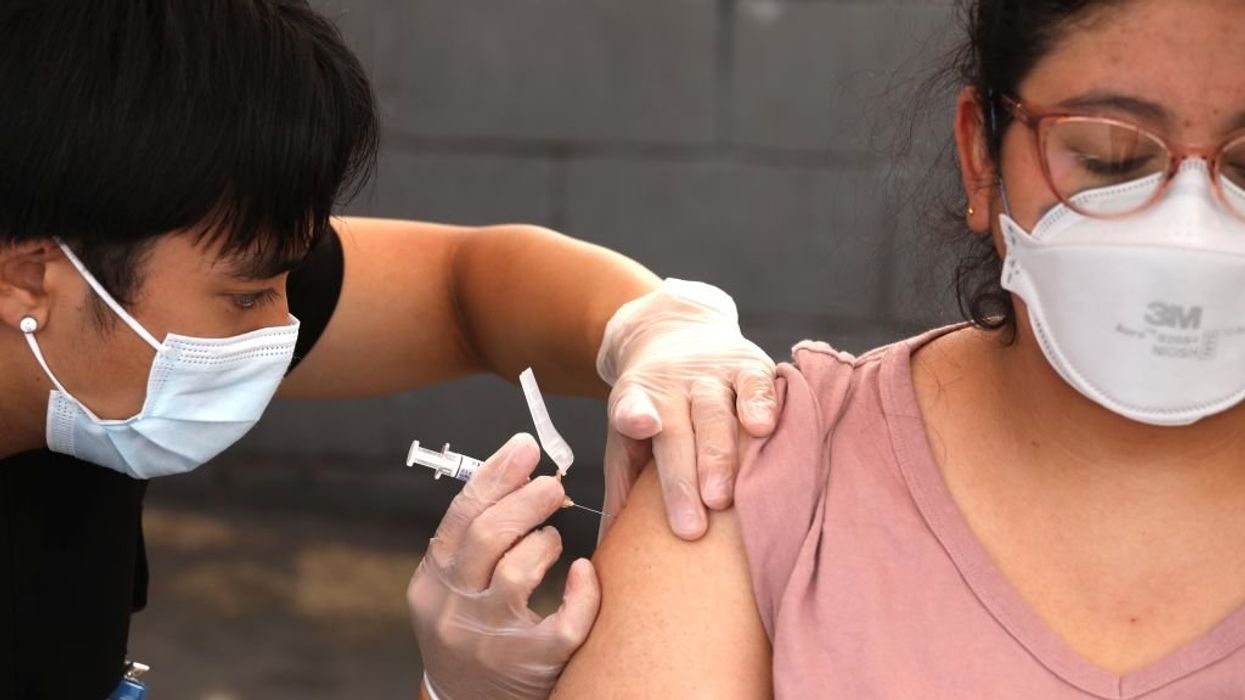
Genaro Molina / Los Angeles Times via Getty Images

Only 2% of Americans have gotten the updated COVID-19 vaccine, according to the Centers for Disease Control and Prevention.
The updated COVID vaccine created to provide more protection against current coronavirus variants circulating was approved by the U.S. Food and Drug Administration on Sept. 11, 2023.
"The approval of Comirnaty (COVID-19 Vaccine, mRNA) (2023-2024 Formula) was granted to BioNTech Manufacturing GmbH. The EUA amendment for the Pfizer-BioNTech COVID-19 Vaccine (2023-2024 Formula) was issued to Pfizer Inc," the FDA stated. "The approval of Spikevax (COVID-19 Vaccine, mRNA) (2023-2024 Formula) was granted to ModernaTX Inc. and the EUA amendment for the Moderna COVID-19 Vaccine (2023-2024 Formula) was issued to ModernaTX Inc."
The next day, the CDC recommended that every U.S. citizen over the age of six months get the updated COVID vaccine manufactured by Moderna and Pfizer-BioNTech.
President Joe Biden added the same day, "I encourage all Americans to stay up-to-date on their vaccines."
The CDC urged, "If you have not received a COVID-19 vaccine in the past 2 months, get an updated COVID-19 vaccine to protect yourself this fall and winter."
Despite the push by the government to get the new shots in the arms of Americans, just about 2% of U.S. citizens have opted to get the new booster vaccine.
The U.S. Department of Health and Human Services revealed that 7 million Americans received the latest updated COVID vaccine – roughly 2% of the United States population.
CNN reported, "In comparison, when last year’s bivalent COVID-19 booster was available, more than 18 million people had received a dose by October 12, 2022, about six weeks after the CDC signed off on it, according to CDC data. By May, about 56.5 million people had received that booster, representing about 17% of the U.S. population."
The vaccination rates for the booster shots are severely lagging compared to previous iterations of the mRNA vaccine aimed at targeting COVID.
According to CDC data, over 92% of U.S. adults received the first COVID vaccine that rolled out in December 2020. Those who got the second mRNA vaccine dropped to 79%, and a mere 20% of Americans received the bivalent COVID booster.
An HHS spokesperson said, "COVID-19 vaccine distribution, which has shifted to the private market, is a lot different than it was last year when the government was distributing them. The Biden-Harris Administration, through HHS, has been working directly with manufacturers and distributors to ensure that the vaccines are getting to pharmacies, hospitals, clinics, pediatricians, and other vaccination sites, including long-term care facilities."
Despite the switch to private distribution, the HHS boasted that pharmacies and other locations have already received nearly 14 million vaccines, and that "91% of Americans 12 years and older can access the vaccine within 5 miles of where they live."
Most Americans can receive a free COVID-19 vaccine through health insurance, local health centers, and pharmacies participating in the CDC's Bridge Access Program.
On Friday, Pfizer announced that the pharmaceutical behemoth would have to cut $3.5 billion in costs due to rapidly deteriorating profits from COVID-19 products.
"Pfizer also announced that it now anticipates full-year 2023 revenues to be in the range of $58.0 to $61.0 billion, versus its previous guidance range of $67.0 to $70.0 billion solely due to its COVID products," the statement read. "Full-year 2023 revenues for Paxlovid and Comirnaty are expected to be approximately $12.5 billion, a decline of $9.0 billion versus original expectations."
Pfizer revealed that has already launched a "multi-year, enterprise-wide cost realignment program that will realign its costs with its longer-term revenue expectations." Pfizer said the cost-cutting measures will save the pharmaceutical company at least $3.5 billion – $1 billion in 2023 and $2.5 billion in 2024.
Like Blaze News? Bypass the censors, sign up for our newsletters, and get stories like this direct to your inbox. Sign up here!